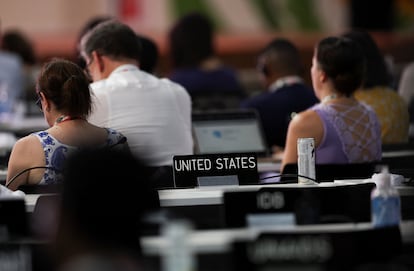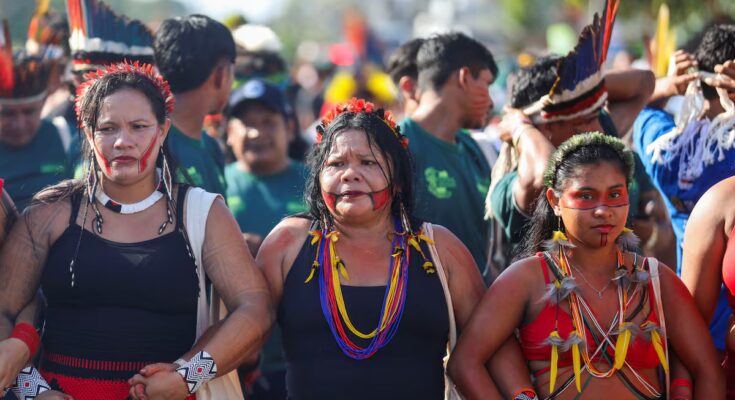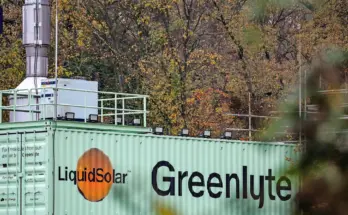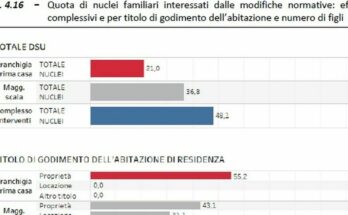If anything distinguishes the COP30 that Brazil hosts in Belém, it is the host country’s interest in having the voices of civil society heard. After three editions in autocratic countries (Egypt, Emirates and Azerbaijan), this resulted in the landing in the Amazon city of thousands of Brazilian and foreign activists with their demands. Indigenous peoples, NGOs, think tanks… civil society in general participates in a summit parallel to the official United Nations one, but does not sit at the negotiating table, which is the exclusive domain of governments. The increase in activists coincides with the reduction in negotiators. In this edition the national delegations have been reduced, either due to the difficulty of obtaining a single room at a reasonable price, or because other emergencies have relegated the climate issue among the government’s priorities.
The crucial week of COP30 began on Monday with the arrival of ministers, but on Thursday the negotiations were suddenly interrupted by a fire. The day before, the host president, Luiz Inácio Lula da Silva, had returned to Belém to give political momentum to his ambitious proposal that the summit illuminate a roadmap to “overcome dependence on fossil fuels”.
With the motto “we are the climate solution”, the indigenous people marched this Monday in front of the summit venue. With them, Minister Sonia Guajajara, the first representative of indigenous peoples in a Brazilian government.
The incident committed days earlier by a group of indigenous Brazilians, who attempted to enter the area reserved for negotiators and injured several agents, led to a strengthening of security. He also focused on the demands of communities who best preserve the Amazon. For the natives the key is the delimitation of their territories. The indigenous Ninahua Huni Kui came to COP30 from the state of Acre specifically to ask for legal protection for the lands that his people had inhabited since before the arrival of the Portuguese in 1500.
The Government took advantage of the international event to announce the demarcation of 10 new lands, including that of the Tupinambá people, who in 2024 managed to convince Denmark to return a sacred layer.
Whenever Brazil organizes a summit, be it BRICS or G20, it makes sure to hold a parallel social forum. On this occasion, the so-called Cúpula dos Povos (the people’s summit) brought together thousands of people representing 1,200 social organizations from more than 60 countries. A part of them arrived along the Amazon River in a flotilla. On Saturday they took part in a large demonstration that began early in the morning to avoid the heat of Belém.
Brazilian trade unionist Vera Paoloni, president of the CUT in the state of Pará, where Belém is located, is one of the participants in this parallel civil society summit. He considers it particularly relevant that the issue of indigenous peoples has entered the debate. And he underlines among the requests that “rich countries pay the bill because without financing there is no adaptation (to extreme phenomena) or mitigation (of emissions)”, which is why, he claims, “multinationals must be taxed”. They also call for the “fight against environmental racism” and “a popular agrarian reform”.
Among the NGOs represented in Belém, some with surprising proposals, such as the Nuclear for Climate group. “Nuclear energy must be part of the solution,” defended Egyptian activist Safa Abdo shortly before the opening of the summit. Also at the entrance to the COP30 pavilion, American activist Nganha Nguyen preached about veganism: “The problem of climate change is livestock. Either we change the diet or there is no future,” she proclaimed in English.
The COP is divided into two areas separated by a kilometer-long walkway. The green one is that of activists, open to the public, full of stands of NGOs, companies and institutions. The blue one, that of the negotiators, and the press, with restricted access, with pavilions of the participating countries and canteens at European prices.
In line with President Donald Trump’s denialism, for the first time Donald Trump’s United States sent no one to a COP. It joins the other three countries that do not participate: Afghanistan, Myanmar and San Marino, according to an analysis of the delegations carried out by Carbon Brief, a media specialized in climate information.

Those participating have significantly reduced their delegations compared to the last edition, according to the Brazilian newspaper Folha de S.Paulo. For example, the alliance of small island countries, those at risk of disappearing due to rising sea levels, has reduced its delegation by 20%, but still sends 957 people, more than the European Union, which with 790 members is almost half compared to last year. China also reduced its delegation.
Many of the 20 Malaysian negotiators arrived together on the first day. They are mid-level officials of the Ministry of the Environment. The eldest has 12 police officers under her belt, so she knows most of her interlocutors because they meet every year. Everyone speaks anonymously to go into detail. They say Malaysia’s overriding goal for COP30 is to “keep the 1.5 target alive”, meaning that the temperature does not rise more than this (a target the UN has already acknowledged will be missed) and “more ambition in mitigation and adaptation targets”.



